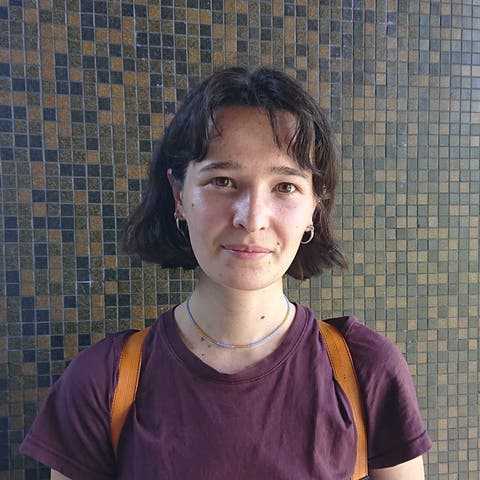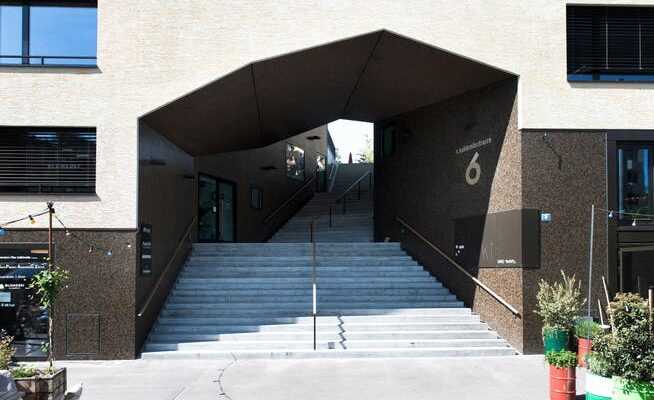With the yes of the urban population to more climate protection, the argument about how begins.
A role model for “net zero” Zurich: the Kalkbreite cooperative.
On the morning of the day when Zurich is overwhelmingly in favor of more climate protection, the climate activist Roxane Steiger stands in the courtyard of the Kalkbreite Cooperative and points around with satisfaction. Cooperative members get their breakfast from the nearby organic shop, trees provide shade, peace flags hang in front of well-insulated windows.
“This place,” says Steiger, “stands for the Zurich that we want.”
Lots of residents in a relatively small space, solar panels on the roofs, heating by heat pumps, buildings with the energy-saving Minergie standard: the whole of Zurich should follow the example of the Kalkbreite Cooperative – if the climate strike collective, to which Steiger belongs, has its way.
His vision: a city with almost no cars, with many more trees, a solar system on every roof – and a housing policy geared towards ecology.
On voting Sunday, Zurich came a little closer to this vision. With 75 percent yes votes, the city has set the “net zero” target in the municipal code. A declaration of principle with more than a symbolic character: According to the will of the electorate, by 2040 the CO2-Emissions drop to 0 – and the emissions caused by city dwellers outside are reduced by 30 percent.
SVP: «Net zero target has biblical status»
All urban districts have approved the bill, most clearly with 86 percent in constituencies 4+5. Most skeptical was the more conservative Schwamendingen, where two-thirds were in favour. The result across the city corresponds pretty much exactly to that of 2008, when Zurich last voted on a climate target – the “2000-watt society”.
Mayor Corine Mauch (SP) spoke to the media about a good day for climate protection. “The clear result shows that the population values climate protection and wants things to move forward.” One now wants to push the replacement of fossil heating and the further expansion of non-motorized traffic.
You have to look for the disappointed opponents on voting Sunday. The SVP was the only city party against “Netto-Zero 2040”. Councilor Walter Anken says: “I’m disappointed, but not surprised. For years, people have been scared of climate change and the fight against it has been given priority politically. The ‘net zero’ goal has reached biblical status in the city of Zurich.”
Anken fears that other problems such as the housing shortage could be neglected in the future because of the climate focus. His party wants to vigorously combat interventions in the individual lifestyle of the urban population in the name of climate protection.
Greens: “Climate protection is only possible together”
The debate about urban climate policy is by no means over. All the less so since “net zero” is purely a declaration of principle and the only concrete measure is annual reporting.
In the future, the central question is likely to be: How is “net zero” implemented in detail?
The vote winners already commented on this on election Sunday. For example, the Greens are demanding comprehensive green roofs and photovoltaic systems. “Net zero” should also become part of every business in the city parliament as an overriding goal – from trams to schools.
“We now know where to go,” says councilor Julia Hofstetter (Greens). “Now it has to be quick.” The result of the vote is a mandate for city politicians to act as one. “Climate protection is only possible together.”
Climate strike: “We need more”
The climate activist Roxane Steiger shows how this looks from the point of view of environmentalists on the morning of the voting Sunday. She deliberately did not choose a green area or a cycle path as a meeting point. She believes that changes in public space are not enough to solve the climate crisis. As here in the Kalkbreite Cooperative, the lifestyle of each and every individual must change in addition to the overarching system.

Roxane Steiger, 22, climate activist and political scientist.
“Voting alone will not solve the problem,” says Steiger. She is 22 and studied political science. “Net zero” by 2040 doesn’t go far enough for her. “We need more courage for faster and more profound changes.”
That is why the climate strike is also demanding a ban on commercial billboards – this is intended to reduce the consumption of goods. In addition, the city should be able to “socialize” non-ecologically used properties, i.e. to transfer them to the general public. These proposals will not have an easy time politically. Other ideas of the climate strike – such as solar energy or more vegan menus in city canteens – could have a chance.
But even the most far-reaching measures are not enough if the city’s population does not cooperate. Personal waivers are also included in all model calculations. Mayor Corine Mauch (SP) therefore emphasized that “net zero” cannot be a purely state task. “It takes everyone: business, private and administration.”
So how willing are the people of Zurich to follow up their yes to more climate protection with action? The answer to this question will determine whether “Net Zero 2040” will be a success – or just an empty phrase.
